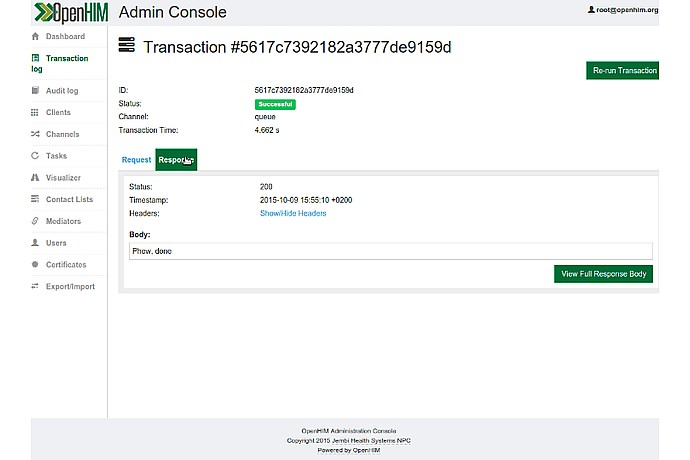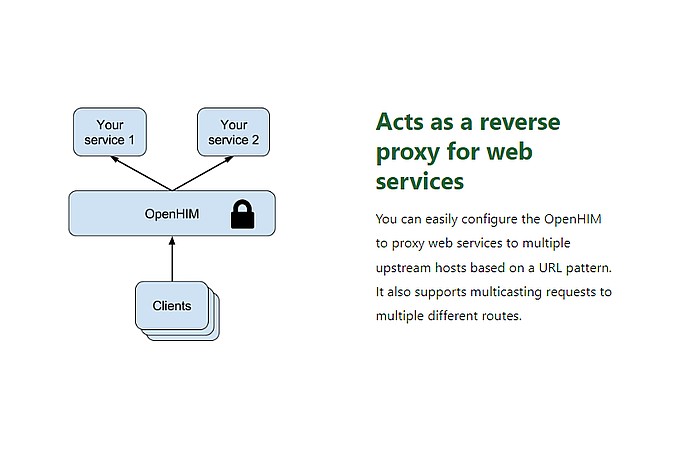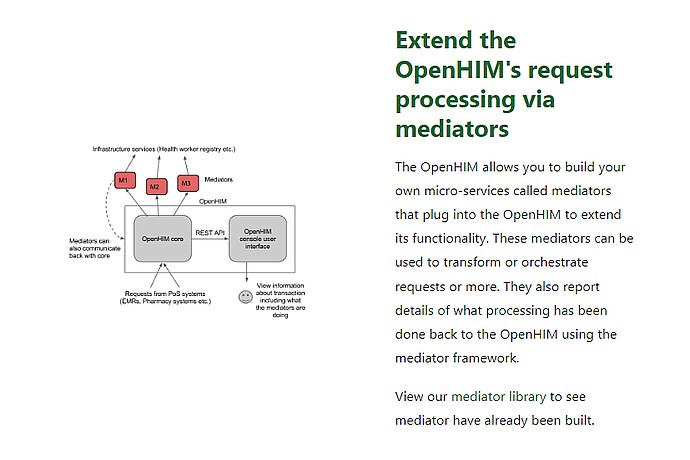
Language
Javascript
Tool Type
Web app
License
Mozilla Public License 2.0
Version
8.2.0
Jembi

OpenHIM is a software application designed to facilitate interoperability between disparate electronic information systems, acting as a central point for the efficient management of data exchange. Its implementation ranges from prototypes to projects to strengthen health systems at the national level, demonstrating its versatility and ability to improve the management of health services. This tool stands out for offering secure communications and effective data control, supporting the routing, orchestration and translation of requests between systems. OpenHIM suits a wide range of projects, especially in low- and middle-income countries, thanks to its multiple features such as reverse proxy for web services and re-execution of failed transactions. Its continuous development ensures that it remains relevant and effective in meeting current healthcare challenges.
In the context of health information exchanges, challenges such as secure access, integrity of patient data, and efficient management of requests to appropriate providers are addressed. A solution that ensures secure transactions and offers centralized management is required to improve efficiency and reliability in health information exchange operations, facilitating compliance and analysis through robust audits.
Centralized Gateway: OpenHIM Core Component serves as a centralized gateway for Health Information Exchange (HIE) systems, providing a single entry point for various healthcare services. Authentication and Authorization: It handles client authentication and authorization, ensuring secure access to healthcare services. Message Routing: OpenHIM Core Component efficiently routes messages to the intended service providers, whether it's an orchestrator or the actual service provider, facilitating smooth data flow within the HIE. Audit Logging: The system maintains comprehensive audit logs of all messages passing through it, ensuring data integrity and compliance with regulatory requirements. Compatibility and Scalability: It is compatible with various versions of NodeJS and MongoDB, and it supports Docker Compose, making it easy to install, deploy, and scale in different environments.
Implements security protocols like TLS/SSL to ensure secure data transmission. Uses standards like OAuth 2.0 and JWT for authentication and authorization. Adopts data formats such as XML and JSON to facilitate interoperability. Incorporates health standards like HL7, FHIR, and DICOM for medical data exchange. Utilizes a web-based architecture managed on Kubernetes, with technologies like NGINX and PostgreSQL. Promotes open source under the Apache 2.0 license, encouraging community collaboration.

Connect with the Development Code team and discover how our carefully curated open source tools can support your institution in Latin America and the Caribbean. Contact us to explore solutions, resolve implementation issues, share reuse successes or present a new tool. Write to [email protected]

This image displays the 'Transactions Log' from the OpenHIM Admin Console, showing a list of HTTP transactions with statuses like 'Processing' and 'Successful'.

This image explains how OpenHIM functions as a reverse proxy, directing client requests to appropriate web services and supporting multicast requests across multiple routes.

This image displays a diagram and text explaining how OpenHIM's request processing can be extended through the use of mediators, enhancing the system's functionality.
Open source middleware designed to facilitate interoperability between health information systems.
Official list of open source tools endorsed by the Digital Public Goods Alliance. This tool is part of this registry.
Article that presents the global alliance to promote digital public goods and its relationship with the IDB.
